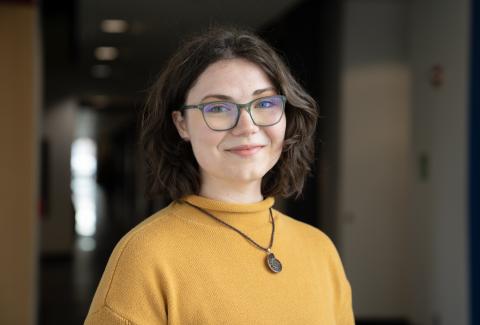
Kayla Tozier is a master's student studying oceanography with a focus in paleoceanography. She received a bachelor's in science here at UNH in earth sciences with a focus in chemical oceanography, and her hometown is in York, Maine.
1. Why did you choose UNH for your graduate program?
As my undergraduate experience at UNH was ending, I felt as though I had missed a crucial amount of hands-on earth sciences research and fieldwork due to a combination of COVID-19, switching departments during my first year, and graduating a semester early. I knew I wanted to continue in this field but had more to learn. Through working in Dr. Robert Letscher’s ocean biogeochemistry lab and a series of marine science internships, I had established great connections in both the UNH and seacoast community, and there was opportunity for exciting hands-on research, so it was the clear next step.
2. What is your Research Focus?
In Dr. Joel Johnson’s sedimentology lab, I use ancient marine sediment records to unravel past conditions of the ocean, a field called paleoceanography. Roughly 20,000 years ago, there was an ice sheet on North America called the Laurentide Ice Sheet. In Durham, the ice was roughly 2 kilometers thick! As the ice sheet melted, there were large meltwater flooding events draining into the Gulf of Mexico. Evidence of these floods have been identified in the sediment records, and my thesis is focused on investigating the impact of these significant freshwater inputs on primary productivity and sedimentation in the Gulf of Mexico.
3. What are you hoping to accomplish with this research? How will it potentially impact society or day-to-day life?
Paleoceanography is not only significant from an Earth history perspective but is the key to better predicting impacts of anthropogenic climate change in the future through understanding the way our planet works systematically. With my research, I hope to better understand the impact that these meltwater floods had on the biological pump and sedimentation in the Gulf of Mexico, which has implications for the history of the carbon cycle on thousand-year timescales. The findings of this research could help to further understand the potential impacts of anthropogenically-driven melting of ice sheets on the future conditions of our oceans.
4. What do you enjoy most about your experience at UNH?
I have enjoyed the interdisciplinary nature of the UNH Earth Sciences department, which has fostered in me a unique perspective on scientific inquiry and a holistic understanding of Earth systems that ultimately led to the research field I am in today. Additionally, the proximity of campus to natural environments, from the ocean to the forests to the mountains, has been important in maintaining a connection with the outdoors and sparking my inspiration.
5. What do you hope to do after your time at UNH?
After graduating this semester with my master’s degree, I will be continuing my studies in a Ph.D. program in paleoceanography and paleoclimatology at another university. My longer-term goals are to continue participating in active research investigating paleoceanographic and paleoclimatic conditions throughout geologic history to close knowledge gaps in predicting Earth system responses to anthropogenic climate change. I will also continue to conduct research that is accessible to all, mentor students from underrepresented groups to increase participation and representation in the sciences and help engage local communities in scientific inquiry.
6. What is your advice for someone on how to best prepare for a graduate program?
My two pieces of advice would be to 1.) gain as many research experiences as possible, and 2.) be curious/ask people questions. It took me working in a variety of research positions, with a range of field work, lab work, and community engagement aspects, to hone in what my ideal graduate program should look like. Secondly, my greatest connections and moments of inspiration would not have occurred without shamelessly asking questions and letting my curiosity show. “Don’t worry about being the most interesting person in the room, just try to be the most interested person in the room.” - James Clear
7. What is the major benefit of the accelerated master’s program?
The accelerated master’s program was a great opportunity to transition from being an undergraduate student, where the focus was on performance in courses and discovering interests, to being a graduate student conducting independent research, forming my own scientific questions, and working with a mentor and on scientific teams. Knowing I wanted to go down the academia and scientific research career path, this program afforded me the skills and experiences to be incredibly intentional about choosing a Ph.D. program, as I now know myself better as a graduate student and as an independent researcher.